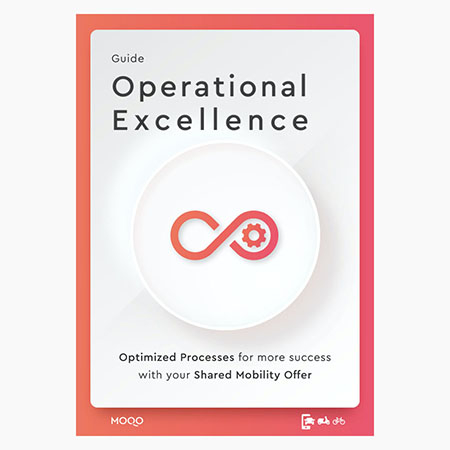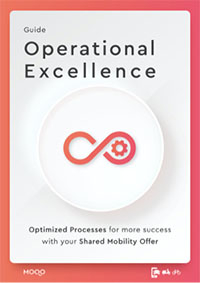The shared mobility sector continues to grow. In 2020 alone, the number of users in Germany increased by about 25 % (source: bcs). Worldwide, revenues are expected to grow by approximately 9% per year until 2026 (source: Statista). However, in order for a mobility service to actually be profitable, it is not only a matter of local regulations and local demand, but also the efficiency of internal work processes. In other words, Operational Excellence.
Why Sharing Providers Should Focus on their Work Processes
The goal of a shared mobility provider revolves entirely around providing users with the right vehicle at the right location. In order to achieve this goal, numerous operational and strategic tasks arise on a day-to-day basis. If these are not clearly managed and organized, avoidable effort and costs are incurred.
How Operational Excellence Has an Impact on Success
Structured and well thought-out processes not only reduce and simplify the internal workload, but they also help to ensure that users actually find a clean, serviced and charged vehicle where they need it. If the customer is happy, so is the provider.
Compact knowledge to go
The guide offers an easy introduction, extensive knowledge, best practices, tips & tricks. In 43 pages, you'll learn how to perform better with your team and add value to your offerings.
What does Operational Excellence mean?
Day-to-day operational tasks play a major role in the functioning of a sharing service. For example, user inquiries must be answered, vehicles must be maintained, charging stations must be monitored and the service must be advertised to the target group. If these processes are not controlled, they quickly take up more time (and thus costs) than necessary.
To optimize internal processes on an ongoing basis, there are a variety of methods in the field of organizational theory which can be utilized. We refer here to the idea of Operational Excellence, which combines the various methods and should be understood more as a guide for the continuous pursuit of improvement rather than as concrete recommendations for action.
Operational Excellence (OPEX) in essence is the ability to regularly improve everyday work processes and continuously develop one's own organization. This includes all processes and systems throughout the value chain. OPEX is about remaining dynamic and flexible, separating the important from the unimportant and not losing sight of what is essential.
An increase in productivity, effectiveness and efficiency boosts performance and at the same time reduces costs. The efforts are targeted at customer satisfaction and ultimately the success of the company or project.
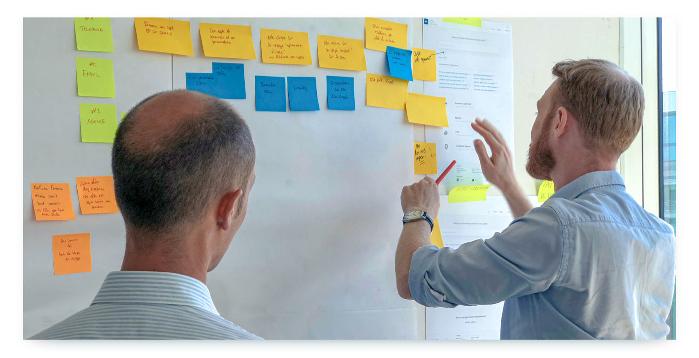
The difference between Operational Excellence and other approaches with the same objective is that here, fighting the causes takes priority over merely fighting the symptoms. Internal processes are optimized and restructured from the ground up to tackle the root cause of potential errors or loss, instead of just dealing with the consequences.
Example
A sharing provider wants to ensure regular cleaning and maintenance of the vehicles. Instead of deploying staff to drive to and individually check vehicles, he/she can rely on user feedback in the Provider Task Board and send staff specifically to the vehicles in need of servicing.
Key Success Factors and Fundamentals of Operational Excellence
Operational Excellence is not a one-time improvement of the rental processes. Rather, it is a dynamic process in which all improvement efforts are aligned with the mobility requirements of the drivers. Therefore, defined target groups and use cases are the center focus, while the company's own corporate strategy forms the basis for all processes and systems. Additionally, current figures, data and facts on user groups, bookings, sales and costs provide an essential foundation for decision-making and action.
To see the fruits of your effort reduce expenses and increase customer satisfaction, it is necessary to have discipline, accuracy and the willingness to make changes.
Challenges and Opportunities for Shared Mobility Providers
In the day-to-day work of a sharing provider on the path to optimized operational processes, there are a number of special considerations to weigh.
In the planning and implementation of their services, sharing providers face the challenge of satisfying different stakeholders, some of whom have different wishes and demands. In addition to a provider’s own perspective and goals and those of the drivers, i.e., the actual customer group, the perspectives of non-riders, cities and municipalities, suppliers and partners must also be taken into consideration in the business model and internal process design. For example, parking locations for a bicycle fleet cannot be selected solely on the needs of the company's own customers, but must also comply with the requirements of local authorities and not represent an obstacle for non-riders.
Another challenge on the way to Operational Excellence can be that the shared mobility service may not be the core business of the company and therefore it isn’t at the focus of all decisions. However, the more efficiently processes are designed, the higher the return on investment will be and the more the costs will be reduced by. Decision makers and executives are paying more attention to shared mobility projects due to its increasingly positive contribution to the overall success of a company.
The pursuit of Operational Excellence offers a good opportunity not only for internal processes, but also for improving the points of contact with customers. To achieve the highest possible satisfaction rate, it is important to focus on the success factors listed in the graph below. In addition to flexible use and rate models, users value uncomplicated and smooth registration, booking and return processes. With the help of good software, processes can be progressively automated and therefore simplified for everyone involved.
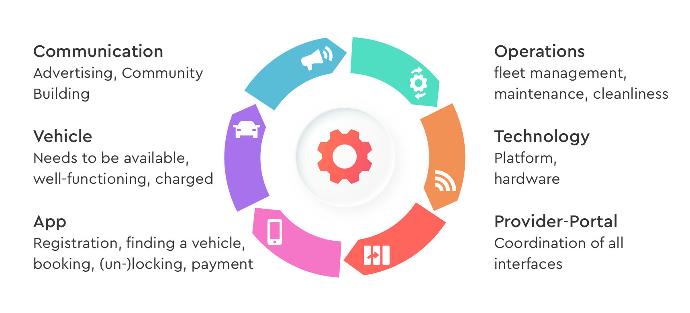
Methods & Tools for Operational Excellence
In vehicle rental, the daily work routine is already filled with processes and tasks. To ensure that improvements in workflows can be implemented in the short term but serve a long-term strategy, it helps to adopt methods that have already been tried and tested. Some of these approaches can be integrated without turning the existing corporate structure upside down. How they prove to be useful depends on the structure and business model of a sharing offering.
Commonly used tools and methods include the following:
Lean Management
Six Sigma
Business Process Management
Change Management
Automated Processes
Agile Processes (SCRUM, Kanban…)
Kaizen
Tasks and Processes of a Shared Mobility Provider
Needless to say, the work of a sharing provider is not finished when vehicle provisioning is complete. Instead, many tasks and processes arise both before and after the launch of the service, some of which build on or merge together.
Getting an overview of these tasks is important for defining responsibilities within the team, defining the points of contact with customers, partners and suppliers, and deciding which tasks can be handled in-house and which can be outsourced.
In the pursuit of Operational Excellence, it is essential to regularly monitor and, if necessary, adjust recurring process flows in order to improve the workflow.
Important Tasks as a Provider
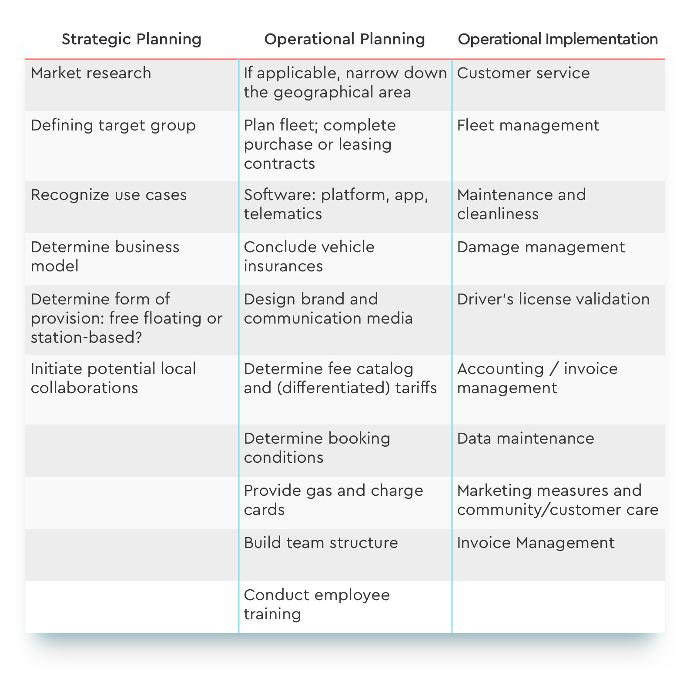
Optimize the Booking Process for Drivers
The Driver Customer Journey is a key factor in driver satisfaction. This refers to the entire process that customers go through when they want to use a shared mobility service, from becoming aware of the offer, registering and booking the vehicle to returning the vehicle and being billed. If these processes are designed effectively and thoughtfully, potential problems or critical points in the driver’s journey will be quickly identified and resolved or considered. It is important for sharing providers to repeatedly put themselves in the driver's shoes and become an expert in the booking process.
If these processes are designed effectively and cleanly, potential problems or critical interfaces will be identified and rectified in good time. For this purpose, it is advisable for sharing providers to repeatedly put themselves in the driver's shoes and to know and understand the details of the booking process.
FAQ on the MOQO Platform Booking Process
1) How do drivers register for a sharing service?
Drivers have three ways to register for a public sharing service: through the offer's website, via email invitation, or directly in the sharing app. For exclusive teams, drivers have the option to request participation via the provider's website. For closed teams, drivers must be invited by a Team Admin.
2) How does driver's license validation work?
Driver's licenses can be validated manually by a Team Admin on site or through an online method. The online method allows drivers to validate their license on their own at a cost per transaction to the provider. For the on-site validation method, information on the location point is supplied by the providers and can be accessed by drivers directly in the app.
3) Which tariffs apply for a booking?
Providers design the tariff models via the platform and can then assign them to teams. Tariffs can be set per hour, day, week or month and can include the cost per additional kilometer and/or a booking fee.
Which MOQO Features Support your Operational Excellence
MOQO regularly develops new features that simplify providers' tasks and processes. Thus, a sharing offer can be steadily customized and optimally tailored to the provider's own target groups and use cases. Through the self-service MOQO Portal, tasks are handled independently of each other, are more standardized and can even be automated.

Self-Service Portal
Provides all the tools to set up and run a sharing service on your own.

Customer Support
Phone (24/7) and email support which assists drivers with questions and special situations.

Provider Task Board
Providers handle tasks transparently and as a team.

Subscription Groups
Providers design a tiered tariff structure to accompdate all potential drivers.

Damage Reporting
The feature enables drivers to record defects and providers to perform maintenance.

Log Book
If required, providers can digitally record trips within the company and in compliance with the tax authorities.

Fees Catalog
Encourage proper handling of vehicles and compliance with booking conditions.

Marketing Tools
‘Discount Codes’ and the ‘Friends Referral’ feature support providers in recruiting new drivers.
Dynamic Process Optimization as a Key Factor
Operational Excellence is essential for shared mobility providers to design an economical and profitable business model. The right tools and methods optimize internal processes, workflows and systems, find the right partners and individually design the business model. At the end of the value chain, providers offer their users the best possible booking experience which increases not only customer satisfaction but also the success of the project.



